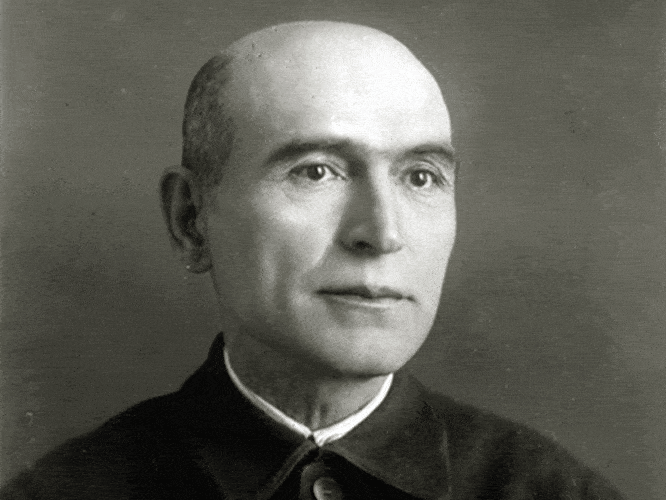Death of Derenik Demirjian (December 6, 1956)

A prolific writer who created in all genres, Derenik Demirjian had an almost sixty-year career, but he was almost seventy when his novel on the Vartanantz War turned him into a household name.
Derenik Demirjian was born on February 6, 1877, in Akhalkalak (Javakhk, now southern Georgia). He received his elementary education in the Armenian parish school and two years later he moved to Ardahan, where he continued his studies until he entered the Gevorgian Seminary of Holy Echmiadzin in 1892. Poet Hovhannes Hovhannisian (1864-1929), a teacher at the seminary, had a beneficial influence on the future writer’s literary formation.
Demirjian then moved to Tiflis, where he graduated from the Nersisian School in 1898. After a short working stint in Ardahan, he returned to Tiflis in 1900, becoming a member of the famous literary group Vernatun (Attic), which got its name after the attic of the residence of poet Hovhannes Tumanian (1869-1923), where the group used to gather. Along with Demirjian, the other permanent members of the group were Tumanian, Ghazaros Aghayan (1840-1911), Levon Shant (1869-1951), Nikol Aghbalian (1873-1947), and Avetik Isahakian (1875-1957). In the meantime, he published his first book of poetry (Poems, 1899). In 1903, he left for Moscow to study music and in 1905-1910 he studied in the school of Pedagogy of the University of Geneva (Switzerland). After returning to Tiflis, in 1925 he moved to Yerevan, where he would live for the rest of his life.
During his Tiflis years, he published two more collections of poetry, Poems (1913) and Spring (1920), where the feelings of desperation, grief, and solitude were predominant. In the meanwhile he also wrote his first short stories and the dramas Vasak (1912) and Hovnan the Wealthy (1919), condemning those who gave prevalence to egotism and self-interest rather than the greater good and fell into moral ruin.
Several of Demirjian’s plays were staged in the 1920s, most particularly Nazar the Brave (1923), a rags-to-riches comedy for “childlike adults and adult-like children,” as he described it. The play about a folkloric figure, with more political overtones, was first performed in 1924. It was later made into an opera and a film (1940).
From the 1920s, in addition to plays, Demirjian wrote in other prose genres, such as short stories, novels, and children stories. He became most famous with his patriotic novel Vardanank (two parts, 1943-1946), dedicated to the Armenian liberation war of the fifth century, which was published during World War II. He was also known as a translator from Russian, especially through his translation of Nikolai Gogol’s novel Dead Souls.
In 1953, Demirjian was elected a full member of the Armenian Academy of Sciences. He continued working and publishing until his death on December 6, 1956, with a novel about Mesrop Mashtots, the creator of the Armenian alphabet left unfinished. He was buried in Yerevan’s central cemetery.
The house where the writer lived from 1929 to 1956 in Yerevan became the Derenik Demirjian House-Museum in 1977, and three years later, a state literary prize named after him was established in Soviet Armenia.
